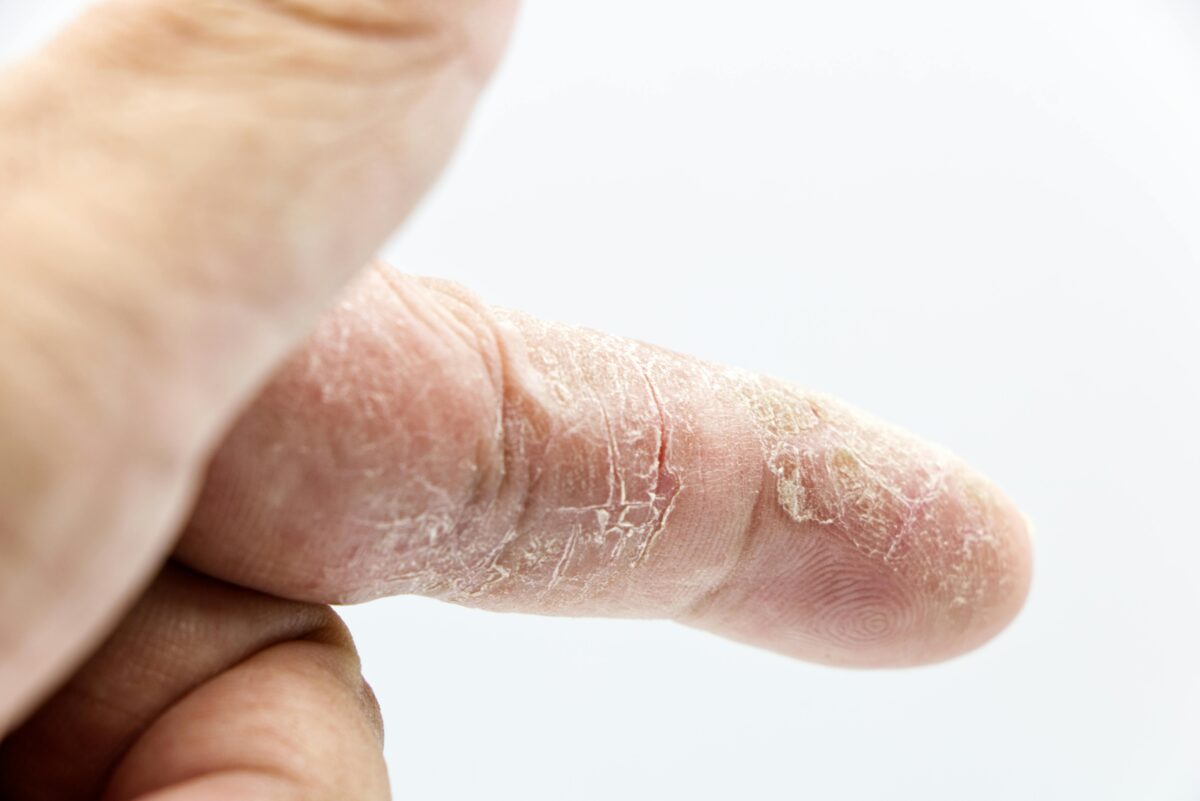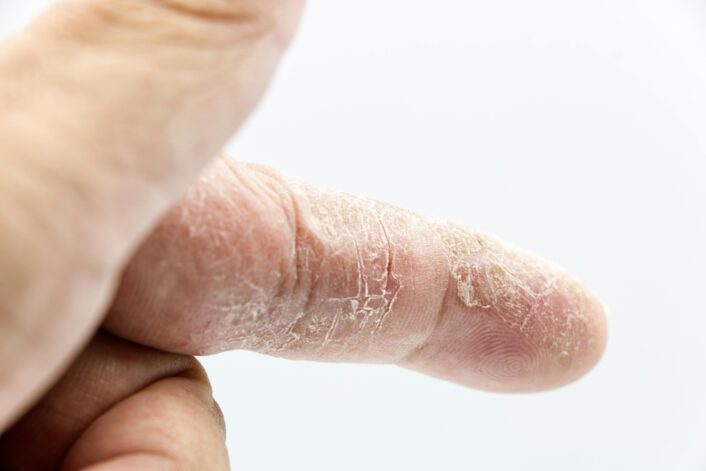Unveiling the Genetics of Skin Dryness
Aira
on
March 8, 2024

Latest Posts
Table of Contents
Unveiling the Genetics of Skin Dryness
Date of Content: February 4, 2024
Written by: Jess Gayo
Reviewed by: Maarit Tiirikainen, PhD
What is Skin Dryness?
In a world where our skin acts as a resilient barrier against environmental stressors, the prevalence of skin dryness emerges as a common concern affecting individuals of diverse demographics.
Skin dryness, scientifically known as xerosis, results from an insufficient amount of water content in the stratum corneum, the outermost layer of the epidermis.
This condition disrupts the skin’s natural lipid barrier, leading to increased transepidermal water loss (TEWL) and compromised moisture retention. Excessive skin dryness, a more severe condition is scientifically known as ichthyosis vulgaris.
The human skin, comprising a complex matrix of cells, lipids, and proteins, requires a delicate balance to maintain optimal hydration levels. Factors such as climate, age, genetics, and lifestyle choices contribute significantly to the onset of skin dryness.
Environmental conditions, including low humidity and excessive exposure to ultraviolet (UV) radiation, can exacerbate this condition, amplifying the need for effective skincare strategies.

What Causes Skin Dryness?
Skin dryness, a pervasive dermatological concern, stems from an intricate interplay of various intrinsic and extrinsic factors.
- Inadequate Moisture Retention: At the core of skin dryness lies a deficiency in the skin’s ability to retain moisture. The stratum corneum, the outermost layer of the epidermis, relies on a balanced composition of lipids and proteins to create an effective barrier against water loss. Disruption in this lipid barrier, often caused by genetic predispositions, can compromise the skin’s moisture-retaining capabilities.
- Environmental Influences: External factors play a pivotal role in exacerbating skin dryness. Low humidity levels, particularly in arid climates, contribute to increased transepidermal water loss (TEWL). Additionally, prolonged exposure to harsh weather conditions, such as cold winds or excessive sunlight, can strip the skin of its natural oils, diminishing its capacity to stay adequately hydrated.
- Age-Related Changes: The aging process naturally induces alterations in skin structure and function. As individuals age, there is a decline in sebum production and a reduction in the skin’s natural moisturizing factors. These age-related changes lead to a diminished ability to maintain optimal hydration levels, rendering the skin more prone to dryness and flakiness.
- Harsh Cleansing Practices: Surprisingly, certain skincare habits can contribute to skin dryness. Excessive use of harsh soaps, hot water, or aggressive exfoliants can strip away the skin’s protective oils, disrupting the delicate balance required for moisture retention.
- Underlying Medical Conditions: Various medical conditions, such as eczema, psoriasis, or thyroid disorders, can manifest with skin dryness as a prominent symptom. These conditions often involve disruptions in the skin barrier function, leading to increased water loss and compromised hydration.
Understanding the multifaceted nature of these factors empowers individuals to adopt targeted skincare practices and lifestyle modifications, fostering a resilient and well-hydrated skin barrier.
What Can Affect Your Skin Dryness?
Genetic Factors
Understanding your skin’s defense involves a key player – filaggrin, a vital protein in the skin barrier. In European families with ichthyosis vulgaris, mutations in the filaggrin gene (FLG) have been linked to atopic dermatitis, a skin condition. One study explored if these gene mutations also play a role in IV/AD in Japan.
European-specific mutations R501X and 2282del4 weren’t found in 253 Japanese individuals. Researchers checked the FLG gene in 4 Japanese ichthyosis vulgaris families and found 2 new mutations, 3321delA and S2554X. These mutations led to a noticeable reduction in keratohyalin granules in the skin.
Researchers then looked at 143 Japanese atopic dermatitis patients and found the FLG null mutations in 8 patients (5.6%). S2554X was in 6 patients (4.2%), and 3321delA was in 2 patients (1.4%). Importantly, these null variants were not present in 156 unrelated Japanese nonatopic and nonichthyotic controls.
These studies suggest that FLG mutations in Japan are different from those in European populations. Filaggrin null variants are significant factors for atopic dermatitis in Japan, and similar to European studies, they may indicate a more severe and persistent form of atopy.
Environmental Factors
Excessive skin dryness is often a result of a delicate balance disrupted by various environmental factors. Understanding the influence of these external elements on the skin’s moisture levels is crucial for effective skincare.
- Low Humidity: Ambient humidity plays a pivotal role in skin hydration. Low humidity levels, characteristic of arid climates or heated indoor environments, can lead to increased transepidermal water loss. As the air becomes drier, the skin struggles to retain moisture, potentially resulting in dry and flaky skin.
- Harsh Weather Conditions: Exposure to extreme weather conditions, such as cold winds and excessive sunlight, can adversely impact the skin’s lipid barrier. Cold weather can strip the skin of its natural oils, while prolonged sun exposure can lead to dehydration. Both scenarios compromise the skin’s ability to maintain optimal hydration, contributing to dryness.
- UV Radiation: Ultraviolet (UV) radiation, a component of sunlight, poses a dual threat to the skin. Beyond its well-established role in skin aging and the development of skin cancers, UV radiation can also disrupt the skin’s barrier function. This disruption not only compromises the skin’s ability to retain moisture but also triggers inflammatory responses that may exacerbate dryness.
- Air Pollution: Environmental pollutants, including particulate matter and chemicals in the air, have been linked to skin dryness. These pollutants can penetrate the skin, leading to oxidative stress and inflammation. The resulting damage impairs the skin barrier, contributing to increased water loss and decreased moisture retention.
- Indoor Heating and Cooling Systems: Artificial heating and cooling systems prevalent in indoor environments can have a dehydrating effect on the skin. Both heating and air conditioning reduce indoor humidity levels, creating an environment where the skin struggles to maintain its moisture balance. Prolonged exposure to such conditions can contribute to chronic skin dryness.
- Hot Water Exposure: While a hot shower may be soothing, it can strip the skin of its natural oils. Hot water can disrupt the lipid barrier, leading to increased TEWL and diminished moisture retention. Opting for lukewarm water and limiting shower durations can mitigate this risk.
- Hard Water: The high mineral content of water, commonly referred to as hard water, can influence skin dryness. Hard water contains elevated levels of minerals like calcium and magnesium, which may react with skin cleansers and form deposits. These deposits can compromise the skin barrier, contributing to dryness and irritation.
Understanding the impact of these environmental factors on skin health empowers individuals to adopt protective measures. From adjusting skincare routines to mitigating exposure to harsh conditions, proactively addressing these external influences is essential in promoting and preserving skin hydration.
Is Excessive Skin Dryness Contagious?
Excessive skin dryness is not contagious; it does not spread from person to person like an infectious disease. The condition is rooted in disruptions to the skin’s natural barrier function and moisture retention mechanisms.
Internally, genetic factors play a role in determining an individual’s susceptibility to skin dryness. Mutations in genes related to skin structure and hydration, such as the filaggrin gene, can predispose individuals to dry skin conditions. However, these genetic factors are not communicable and do not transfer between people.
It’s important to recognize that skin dryness results from a complex interplay of genetic, environmental, and individual-specific factors. Unlike contagious conditions caused by pathogens like bacteria or viruses, skin dryness is a non-communicable concern.
While one person’s skin dryness does not spread to others, individuals suffering from skin dryness may share similar environmental triggers or genetic predispositions.
To manage and prevent skin dryness, adopting a tailored skincare routine that includes moisturization, protective measures against environmental factors, and a healthy lifestyle is essential.
Understanding the non-contagious nature of skin dryness underscores the importance of personalized care to address the unique factors influencing an individual’s skin health.
Can Excessive Skin Dryness Go Away Permanently?
While managing skin dryness is possible, achieving a permanent cure is challenging. Scientifically, the skin’s natural ability to retain moisture diminishes with age, making long-term management crucial.
However, adopting a consistent and effective skincare routine, including moisturization and protection against environmental stressors, can significantly improve and control dry skin. Lifestyle modifications, such as staying hydrated and avoiding harsh skincare practices, play a pivotal role.
While complete eradication may be elusive due to the multifaceted nature of skin dryness, proactive and persistent care can lead to substantial and lasting improvements. A holistic approach addressing genetic, environmental, and lifestyle aspects ensures sustained relief and enhances the overall health of the skin.
You may also be interested in: Genetics & Rosacea: What You Need To Know
Can Vitamin Deficiencies Cause Excessive Dry Skin?
Vitamin deficiencies can contribute to dry skin. Scientific evidence highlights the role of certain vitamins in maintaining skin health. Vitamin A, for instance, is crucial for skin cell development and repair. Its deficiency can lead to a skin dryness condition known as xerosis, characterized by dry, rough skin.
Vitamin E, with its antioxidant properties, helps protect the skin from oxidative stress and moisture loss. Inadequate levels may compromise the skin’s ability to retain hydration. Also, vitamin D is involved in skin barrier function, and its deficiency has been linked to various skin issues, including dryness.
B vitamins, particularly Biotin (B7) and Niacin (B3) play roles in skin metabolism and hydration regulation. Insufficient levels can contribute to dry, flaky skin. Furthermore, vitamin C is essential for collagen synthesis, promoting skin elasticity and moisture retention.
Addressing vitamin deficiencies through a balanced diet or supplements, as recommended by healthcare professionals, can positively impact skin health.
However, while vitamin deficiencies can contribute to dry skin, they are just one aspect of a comprehensive approach that includes proper skincare, hydration, and lifestyle choices for optimal skin well-being.
How to Improve and Manage Excessive Skin Dryness
Managing and improving skin dryness involves a multifaceted approach, addressing both internal and external factors that influence skin health. Scientifically-backed strategies contribute to the restoration and maintenance of optimal skin hydration.
Hydration from Within
Adequate hydration is foundational for skin health. Consuming sufficient water helps maintain the body’s overall moisture balance, reflected in the skin. Studies suggest a positive correlation between water intake and skin hydration, emphasizing the importance of internal hydration for combating dryness.
Nutrient-Rich Diet
Incorporating a diet rich in essential nutrients supports skin health. Vitamins A, C, E, and B-complex vitamins are crucial in skin function. Foods such as fruits, vegetables, whole grains, and lean proteins contribute to the maintenance of skin integrity and hydration.
Omega-3 Fatty Acids
Omega-3 fatty acids, found in fish oil and certain plant sources, have anti-inflammatory properties and contribute to skin barrier function. Research indicates that supplementing with omega-3 fatty acids can enhance skin hydration and mitigate symptoms of dryness.
Moisturization
External moisturization is pivotal for managing skin dryness. Applying emollients and humectants helps create a protective barrier, preventing water loss. Look for moisturizers containing ingredients like hyaluronic acid, glycerin, and ceramides, which are supported by scientific evidence for their efficacy in maintaining skin hydration.
Avoiding Harsh Cleansers
Harsh soaps and cleansers can strip the skin of its natural oils, exacerbating dryness. Opt for gentle, fragrance-free cleansers to maintain the skin barrier’s integrity. Scientifically formulated cleansers with a balanced pH are recommended for those prone to dry skin.
Limiting Hot Water Exposure
Prolonged exposure to hot water can deplete the skin’s natural oils. Opt for lukewarm water during showers or baths to prevent excessive drying. Additionally, reducing the duration of showers helps minimize the impact on skin hydration.
Humidification
Increasing indoor humidity levels can benefit skin hydration, especially in dry climates or during winter. Using humidifiers helps counteract the drying effects of artificial heating or cooling systems, maintaining a more favorable environment for the skin.
Protecting from Environmental Stressors
Shielding the skin from harsh weather conditions, UV radiation, and pollutants is crucial. Wearing protective clothing and using sunscreen with a high SPF helps minimize environmental damage, preserving the skin’s moisture balance.
Identifying and Managing Allergens
Allergens can exacerbate skin dryness, particularly in conditions like atopic dermatitis. Identifying and avoiding potential allergens, with the guidance of a healthcare professional, contributes to effective dry skin management.
Consulting a Dermatologist
Consulting a dermatologist is advisable in cases of persistent or severe skin dryness. Dermatologists can provide personalized insights, prescribe medicated creams, and conduct thorough assessments to address underlying causes.
Incorporating these evidence-based strategies into a comprehensive skincare routine empowers individuals to proactively manage and improve skin dryness, fostering a healthy and hydrated skin barrier.
LifeDNA’s Skin Dryness Trait Report
Unlock the secrets to radiant, well-nourished skin with LifeDNA’s Excessive Skin Dryness Trait Report. Our scientifically-backed Skincare Report delves into your unique genetic profile, revealing insights that empower you to take charge of your skin health.
Understanding the genetic factors contributing to excessive skin dryness allows for personalized skincare strategies, ensuring you provide your skin with precisely what it needs.
Your wellness journey starts with knowledge. LifeDNA’s comprehensive Skincare Report extends beyond excessive dryness, offering in-depth insights into other dermatological concerns like eczema, increased nasolabial folds, and psoriasis.
With 7 main Reports and nearly 200 trait reports spanning Vitamins & Supplements, Wellness, Nutrition, Fitness, Sleep, and Personality & Cognition, LifeDNA delivers a holistic understanding of your body’s and mind’s needs.
Wellness is more than skin deep – it’s a daily commitment. Our reports empower you to make informed choices tailored to your genetic makeup. Uncover the keys to a healthier, happier you and explore the broader spectrum of traits influencing your overall well-being.
Embark on your wellness journey today with LifeDNA. Avail our plans and gain access to a wealth of insights that will transform how you care for your body. Don’t just live life; live it in harmony with your unique genetic blueprint. Your journey to optimal well-being begins now.
Summary
- Skin dryness, or xerosis, is a common concern influenced by a complex interplay of genetic, environmental, and lifestyle factors.
- Genetic factors, such as mutations in the filaggrin gene (FLG), can contribute to skin conditions like atopic dermatitis, with variations observed across populations.
- Environmental influences, including low humidity, harsh weather conditions, UV radiation, air pollution, and hot water exposure, play pivotal roles in exacerbating skin dryness.
- Excessive skin dryness is not contagious; it is rooted in disruptions to the skin’s natural barrier function and moisture retention mechanisms.
- Achieving a permanent cure for skin dryness is challenging, but proactive skincare, hydration, and lifestyle modifications can lead to substantial and lasting improvements.
- Vitamin deficiencies, particularly A, E, D, B-complex, and C, can contribute to dry skin, emphasizing the importance of a balanced diet and supplementation.
- Managing skin dryness involves a holistic approach, addressing both internal and external factors, with hydration, nutrition, omega-3 fatty acids, and proper moisturization playing key roles.
- Avoiding harsh cleansers, limiting hot water exposure, taking care of humidification, protecting your skin from environmental stressors, identifying allergens, and consulting a dermatologist are essential strategies for managing and improving skin dryness.
References
- https://www.mountsinai.org/health-library/diseases-conditions/xerosis#:~:text=Dry%20skin%20is%20common%20and,the%20dry%20and%20scaly%20appearance.
- https://www.medicalnewstoday.com/articles/318242#:~:text=Ichthyosis%20vulgaris%20is%20a%20type,skin%20is%20known%20as%20xerosis.
- https://www.mayoclinic.org/diseases-conditions/dry-skin/symptoms-causes/syc-20353885
- https://www.jacionline.org/article/S0091-6749(06)03919-4/fulltext
- https://www.condairgroup.com/humidity-health-wellbeing/how-dry-air-affects-our-skin#:~:text=Low%20humidity%20can%20draw%20moisture,bleeding%20through%20continuous%20destructive%20scratching.
- https://www.who.int/news-room/questions-and-answers/item/Radiation-effects-of-ultraviolet-(uv)-radiation-on-the-skin-eyes-and-immune-system#:~:text=UV%20radiation%20accelerates%20skin%20aging,wrinkles%20and%20dry%2C%20coarse%20skin.
- https://world.comfortzoneskin.com/blogs/blog/is-hot-water-bad-for-your-skin#:~:text=Dry%20skin%3A%20Dry%20skin%20is,barrier%2C%20leading%20to%20increased%20sensitivity.
- https://www.raynewater.com/blog/a-guide-to-the-effects-of-hard-water-on-skin/#:~:text=The%20most%20common%20negative%20effects,be%20a%20source%20of%20irritation.
- https://www.cerave.com/skin-smarts/skincare-tips-advice/dry-or-dehydrated-skin-tips#:~:text=Healthy%20skin%20contains%20approximately%2030,elasticity%2C%20strength%2C%20and%20plumpness.&text=When%20your%20skin%20loses%20more,skin%20condition)%20is%20lacking%20water.
- https://www.aveeno.com/journal/breaking-down-omega-3-benefits-skin#:~:text=Omega%2D3%20fatty%20acids%20are,But%20that’s%20not%20all!
- https://my.clevelandclinic.org/health/diseases/16940-dry-skin
Customer Reviews




*Understanding your genetics can offer valuable insights into your well-being, but it is not deterministic. Your traits can be influenced by the complex interplay involving nature, lifestyle, family history, and others.
Our reports have not been evaluated by the Food and Drug Administration. The contents on our website and our reports are for informational purposes only, and are not intended to diagnose any medical condition, replace the advice of a healthcare professional, or provide any medical advice, diagnosis, or treatment. Consult with a healthcare professional before making any major lifestyle changes or if you have any other concerns about your results. The testimonials featured may have used more than one LifeDNA or LifeDNA vendors’ product or reports.
- Category: Skincare



